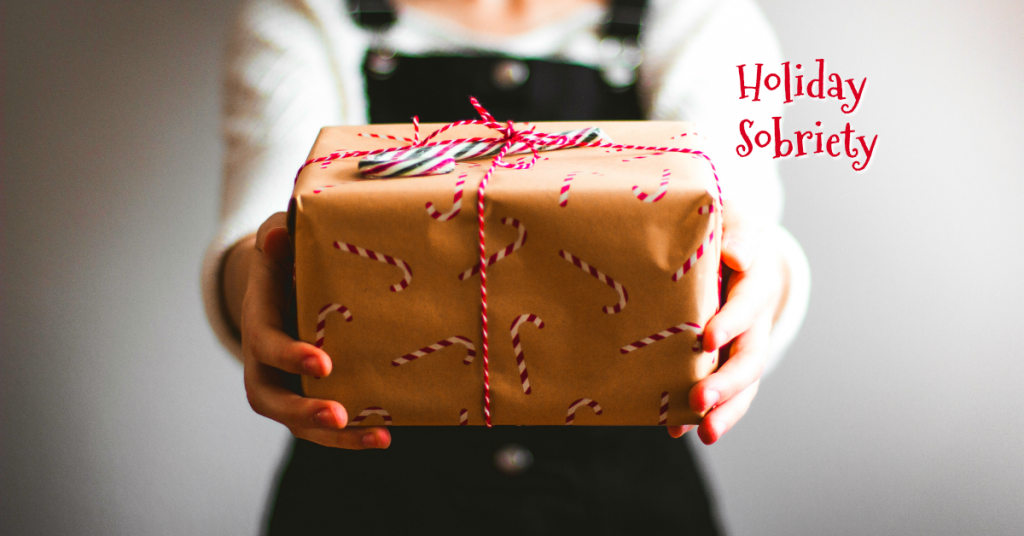Just think of the Happy Memories – Holiday Sobriety
The holidays can be a time for family gathering and joyful celebration. However, if you have dysfunction in your family (combined with an addiction problem) these times can be stressful and lonely. If you are newly sober it can even trigger for relapse. For folks who are new to recovery and even those with a little sobriety “under their belt”, it’s important to be prepared.
Be ready for some problems and emotions that will almost certainly “pop-up” during the holidays. Don’t fret, you can learn how to recognize relapse signs and stop destructive behaviors. You can learn to avoid situations that could result in relapse.
Don’t succumb to pressure. Most of us who have a history of drug and alcohol problems come from families with all kinds of toxic drama. The few of you who were raised in perfect families (yes there are a few people like that) need to remember that you were the toxic drama. Your family might come to expect you to ruin their fun. This can leave you defensive and “off the beam”.

Noticing the signs of a relapse is important for a recovering addict. The signs of “old behavior” can appear in thoughts or actions. It’s important that you know your own personal sensitivity points and avoids anything you think may sabotage you. If you can’t avoid certain emotions or places, have a sober friend join you at social gatherings. You may want to skip occasions where alcohol or drugs may be present. Even if you don’t think it will be a problem, it’s still better to plan ahead of time, just in case you feel uncomfortable. Remember, no occasion is important enough to give up your freedom. Staying home is always an option.
Here are a few simple suggestions that can help you make a practical plan for Holiday Sobriety
“Out” Yourself
Addiction is a recognized disease. It’s no longer considered a moral failing or a lack of willpower. If it’s appropriate, you might want to just be honest with the people you trust. Most people will understand and be more than willing to help. You will learn who your true friends are and find the people who have gone through addiction treatment themselves; they will want to help. Remember, you need to develop a support network and know who to trust, in times of need.
Surround yourself with other sober people
Make plans with friends and family so that you are not alone during the holidays. Research has discovered that the people who have more social interactions and connections have stronger immune systems, a longer lifespan, and a reduced risk of stroke. It is also beneficial for you to spend a bulk of your time with people who are sober, both at meetings and outside them.
Have several backup plans
At each party or gathering, you attend, be sure that you have a way to leave early. Being stuck somewhere there is likely to be drunk people and alcohol isn’t a good idea. This is true especially for someone in addiction treatment or newly sober. Even for people with a lot of sobriety, this can be challenging.
Holiday Sobriety starts with non-alcoholic drinks
This is an easy way to block people from pressuring you to drink or ask why you are not drinking. Too much pressure can lead to a very uncomfortable situation. Practice a quick and straightforward response ahead of time. This will help you to quickly move on to a different topic of conversation. It can be something as easy as, “I’m not drinking tonight”. If you rather avoid talking about it all together, you can say you are the sober driver or that you are on medication that is dangerous when combined with alcohol.
Practice dealing with peer pressuring people
This is important if this is your first holiday in sobriety. Concerned family members may have caring questions, but others may seem as though they are deliberately trying to put you down or make you feel uncomfortable. Practicing answers to these types of questions with a trusted sober friend is a good method of preparation. There’s nothing wrong with just not answering a question you are uncomfortable with.
Be happy and positive — addiction treatment during the holidays can be a powerful way to begin a new year, create a new you, and build a new life.
The cost of drinking and using drugs during the Holiday
If you are abusing drugs or alcohol. There is a good chance, you will get in trouble behind the wheel. A DUI can cost you your life, and up to $20,000 when you add up all of the fees and legal expenses.
Buzzed driving is drunk driving – just because someone may have had only one or two drinks does not mean they are OK to drive. Consuming alcohol can impair judgment and make people less likely to make the best decision for the safety of themselves and others. As a result, they may think they are OK to drive when they are not.

Alcohol slows a driver’s reaction time, reduces their ability to properly gauge speed or distance from other objects and makes it difficult for them to focus on the road.
Sometimes, one or two drinks are all it takes to impair someone’s ability to drive. Alcohol steadily decreases a person’s ability to drive a motor vehicle. The more you drink, the greater the effect.
Planning ahead for a sober ride is the best way to ensure you get home safely. Don’t wait until after you have started drinking. Designate a driver or arrange for someone you trust to pick you up. That also applies to others you know. If you know someone who is about to drive impaired, take their keys and find them a sober ride home. You can go to Sober Rides for assistance.
Newly Sober and the Holidays still have you down
Try these tips from Psych Central
You’re not alone if you’re not exactly feeling in the holiday spirit this year. Too many crowds, too much Christmas music, too many family obligations. You eat and drink like there’s tomorrow, but then have to wake up the next morning anyway.
It can all be a bit too much. The holidays can get us down, but we can also fight back. So how exactly do you fight back?
Kick the Stress
You can kick the holiday stress by doing as much planning as possible. Plan your time with extended family, plan who’s cooking that day, and where you need to be on which day. The more you schedule things (and stick to that schedule!), the more likely you won’t be stressed out by having to make a dozen last-minute decisions.
Now is the time to do those things you’ve done in the past that help you successfully deal with stress. If you like to exercise to keep the stress at bay, make sure you keep to your regimen as much as possible. If you like to get a massage, now’s the perfect time of year to get one. In short, stick to the coping skills you like to use and that work best for you. (Here are some new relaxation or meditation techniques to try out if you need them.)
Don’t put off using them because “there’s no time,” or “I have to be there for others.” You can’t be there for others if you don’t take care of your needs first.
Remember That Moderation is Best
It’s easy to go overboard with everything during the holidays. We tell ourselves, “Hey, I deserve this” or “One more helping won’t really hurt anything.” We feel like it’ll help the stress if we have one (or two, or three) extra drinks to help deal with our family. But overdoing it rarely helps anything, and makes us feel worse in the long run.
Yeah, it’s a pain to stick to eating a healthy diet and not over-indulging during the holidays. So do this instead: allow yourself one extra helping at one meal a day, or one extra dessert. Giving yourself an allowance for a little extra ahead of time can help you keep to reasonable limits, while still allowing yourself to enjoy the holidays.
Don’t Try to Change Anything Big
Now’s not the time to start a new diet, a new routine, or try out a new personality. Sticking to what’s worked in the past is usually best, with a few little tweaks here and there to help make things even better. You can, of course, always try and change things for the better. But it’s wiser to do so in little bits and pieces, not all at once.
Want to improve your relationship with a family member? Take baby steps to work on more clearly communicating with them without snark, sarcasm, or bringing up past embarrassments or hurts. Actions speak louder than words, so no need to tell others you’re working on improving these things — just do it.
Prepare for the Tense or Awkward Situations
A good offense is the best defense, the saying goes. So if you prepare ahead of time for such situations by setting realistic expectations and work to minimize conflict with others. I love the advice given here:
If your mother-in-law — you know, the one who tends to push your buttons — is staying with you for several days, figure out how you’ll approach her when she inevitably hits a nerve, Taliaferro said. Let’s say she criticizes your parenting. When she makes a comment, Taliaferro said, you might reply:
“I love how much you care about the kids,” and “recognize her intention, which really is about caring for the kids.” Or you might say: “Thank you for respecting my parenting style. I know sometimes that’s hard to do.”
It may also help to give yourself some alone time after interacting with a particularly unhelpful family member. Excuse yourself and go for a nice brisk walk outside to help clear your head and re-establish your calm.
Need More Holiday Sobriety Help?
They got you covered with our annual, updated Coping with the Holidays Guide, a survival guide that is chock full of dozens of articles to help you with specific concerns, situations and issues. Check it out (and please share with your friends and family if you think it may help them too)!
Need Help with Resources or Insurance
I’ve got you covered. Just call me at 800-544-5976. Yes, you can even call me on a holiday.
One last thing, don’t enable people during the holiday. Most of us have a few family member who is suffering from addiction. It’s a very thin line between helping them and harming them. Knowing when to practice tough love, is a very important skill.
